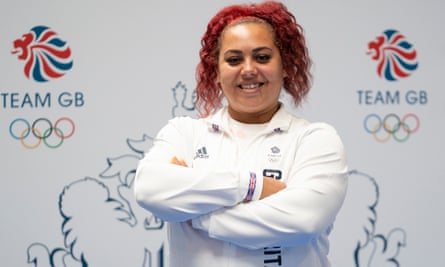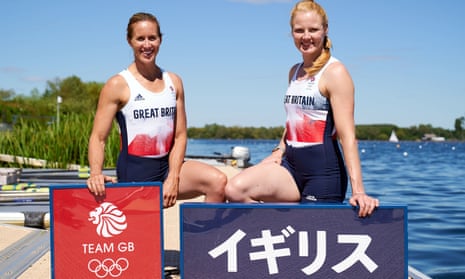At the Hokusai Museum, a short ride from where the British athletes are staying in the Olympic village, there is a giant image of the Japanese artist’s most famous work: the Great Wave off Kanagawa. Higher and higher the great wave rises, until it stands taller than Mount Fuji itself. But then, inevitably its tremendous power and energy starts to flatten, then fall.
That picture may yet serve as an analogy for Team GB’s Olympic momentum here in Tokyo. Since finishing 36th in the medal table in Atlanta in 1996, behind Ireland and North Korea, it has ridden an enormous wave, from Sydney to Athens, London to Rio, from no-hopers to world-beaters. But, after winning 67 medals and finishing second in 2016, UK Sport is now targeting between 45-70 medals and a top-five finish in Tokyo.
That is a distinct and welcome shift. Five years ago the blunt and unflinching message from UK Sport was medals, medals, medals. There even was madhouse talk of trying to overhaul the 54-medal gap to the USA in Tokyo. Now, under UK Sport’s impressive chief executive, Sally Munday, the message is more human: it is about medals and moments, culture and compassion, and, intriguingly, managing expectations.
“We are really confident that we’ve got a well-prepared team with tremendous ability to create those extraordinary moments,” she explained hours before the opening ceremony. “And we’re excited by the medal-winning potential of this team. But these Olympics are about more than medals. The British public get that. They realise this is a slightly different Games.”
The hope in UK Sport towers is that the public and media will accept that Britain’s team of 376 athletes is younger on average than in London and Rio, so is unlikely to peak until Paris in 2024. And that getting such a large team here during the pandemic is an achievement in itself. But there is also an unstated recognition that some of the scandals across British sport have put the zealous pursuit of medals at any cost into necessary perspective.
Sure, it was a hell of a ride from Atlanta to Rio. But, as we have learned over the last five years, it came with costs and casualties. A major inquiry into abuse at British Gymnastics is ongoing. Numerous sports have faced allegations of a culture of fear. Meanwhile a former British Cycling doctor, Richard Freeman, was also recently found guilty of buying banned testosterone for an unnamed rider.
But there is a sense that things are improving for the better and Munday was optimistic the British team would make headlines for the right reasons in Tokyo. “The Olympics is a worldwide celebration of sport that always delivers these extraordinary moments that lift and inspire us,” she said. “A recent UK Sport survey found that 76% of the public will follow the Games – and a similar proportion feel a sense of pride when our athletes are successful.”
There is still plenty for Team GB to celebrate at these Olympics, not least the fact that, for the first time ever, it is sending more women than men.
Many of the headline stars are also women – including Dina Asher-Smith in the 100m and 200m, cyclist Laura Kenny, and the extraordinary Helen Glover, who is attempting to win her third Olympic title after having three children since taking gold five years ago in Rio.
Thankfully there has also been more effort to thrust more amazing British athletes, who won’t necessarily win medals, into the public eye. They include Emily Campbell, a super-heavyweight weightlifter who worked with children with special educational needs when she started competing internationally four years ago. Her aim, she told the Guardian, wasn’t only to stand on the podium.
“I don’t look like a typical athlete,” she said. “I’m not little. But if I can get one girl to go to the gym after watching me, or to change people’s perceptions in society, I’ve definitely done my job.”

The British Olympic Association chair, Hugh Robertson, also hopes that working with the likes of Gareth Southgate in the last few years will help some of England’s culture at Euro 2020 rub off more widely. “There’s an enormous pooling of the things that work best about British sport, that are now getting spread around in a way they probably weren’t 20 years ago,” he said. “A lot of that sort of values‑based stuff is now becoming much wider spread.”
Arguably, there is still much to do. The 2004 Olympic rowing silver medallist Cath Bishop, one of the astute critics of the system, says success at the elite level must be looked at in the broader context of society.
“There are multiple champions who have spoken about feeling empty, depressed even after winning and the medal on its own is meaningless unless it is connected to something of lasting value,” she said. “It’s the stuff that outlasts the podium that should be the real measure of success.
“How many athletes have actually inspired others to be active, to take up sport, or are themselves still involved in sport in years to come?” she added. “The statistics are not great and a recent UK Active study showed that children are more inspired by teachers and personal role models than elite medal winners – ‘superhuman superheroes’ that no one can relate to.”
Munday, though, still believes the sight of British athletes trying to go faster, stronger and higher together will inspire millions watching back home.
“We’re excited by the medal-winning potential of this team, and by the opportunity also for us to assess the long-term health of Olympic and Paralympic sport in the UK,” she said. “The future is pretty bright.”
